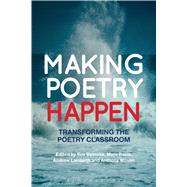Making Poetry Happen provides a valuable resource for trainee and practicing teachers, enabling them to become more confident and creative in teaching what is recognized as a very challenging aspect of the English curriculum. The volume editors draw together a wide-range of perspectives to provide support for development of creative practices across the age phases, drawing on learners' and teachers' perceptions of what poetry teaching is like in all its forms and within a variety of contexts, including:
- inspiring young people to write poems
- engaging invisible pupils (especially boys)
- listening to poetry
- performing poetry
Throughout, the contributors include practical, tried-and-tested materials, including activities, and draw on case studies. This approach ensures that the theory is clearly linked to practice as they consider teaching and learning poetry to those aged between 5 and 19 from different perspectives, looking at reading; writing; speaking and listening; and transformative poetry cultures. Each of the four parts includes teacher commentaries on how they have adapted and developed the poetry activities for use in their own classroom.








